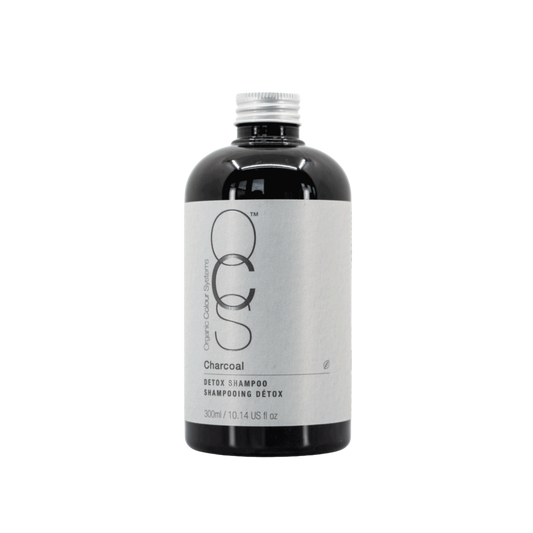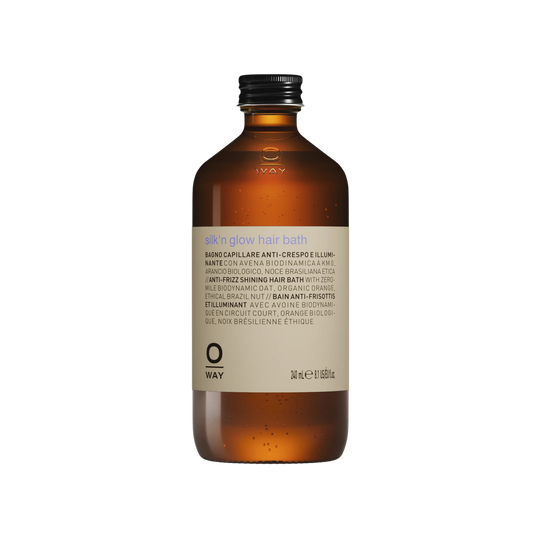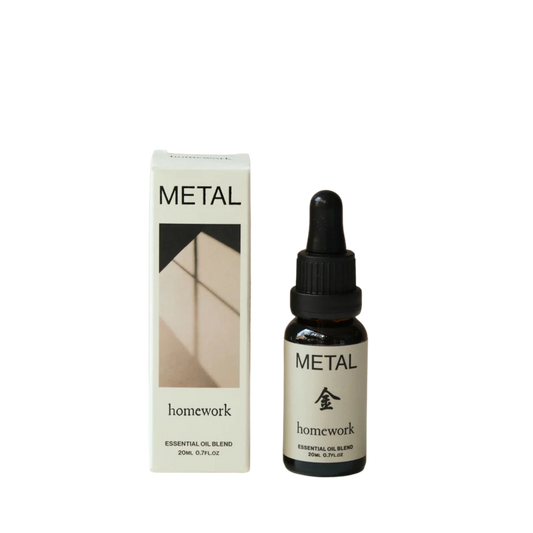Historian, traveller, muse: Tara Mayer is a true embodiment of the modern woman, combining her interests in academia and style in a carefully curated lifestyle that’s grounded in minimalism. Born in Hawaii of mixed German/Indian heritage, Tara went on to spend the majority of her adult life between London and Paris before moving to Vancouver with her husband and their daughters.
At Glasshouse, our focus is long-term hair health and so we love to see women embracing their natural hair texture; Tara’s beautiful waist length hair falls in natural curls which she cares for with plant-based products and home remedies. We interviewed her to find out more about her haircare routine and her holistic outlook on life.
How has growing up in Hawaii influenced your approach to health and wellness?
A superficial body-consciousness is common in places with beautiful beaches and sunshine – where there’s surf culture and you’re in a swimsuit a lot – but people in Hawaii tend to have a holistic understanding of health and wellness and a strong connection to the land. A teacher I had in third grade made us all walk out of the classroom once and lie down on the ground. We had to lay there very still, with our skin against the earth. The land would support us, she said. It would give us strength when we need it and we could always return to it. After the birth of my daughter, my body took forever to feel strong again. I wanted to return to running but everything felt off. My knees wobbled, my hips hurt, and I was breathless quickly. One evening, after a really frustrating attempt, I let myself collapse onto a grassy field at the bottom of our road. It was raining and cold – quite unlike that childhood experience – but it had the same effect and I walked home trusting and calm. Growing up in Hawaii, health and wellness were less about chasing a specific, physical ideal, than about figuring out what sustains us, and knowing how to tap into that.
Having travelled to new countries from a young age, do you feel your international upbringing has helped to shape your definition of beauty?
Travelling from Hawaii to India, where we spent summers with my mother’s family, we passed through Japan or Korea and I was hugely influenced by both fashion and beauty in those places. I loved that women were very chic, but had totally natural hair and really glowing, bare skin. That contrast of sober, studied clothing and completely uncontrived beauty seemed so elegant to me. I lived in Paris for a long time and was drawn to the same thing there. I would be on the metro or walking home and notice messy hair tucked into a great coat and become intrigued, imagining that woman’s life or job. For me, there’s an aura, an intellectualism, about women who embrace their singularities instead of masking ‘imperfections.’
Have you always embraced your natural hair or was there ever a time when you felt you needed to style your hair differently?
I’ve had natural, waist-length hair all my life. Being half Indian, I was raised with the idea that long hair connotes beauty and sensuality and in Hawaii, that’s a common ideal as well. Over time, it’s become a part of me, a constant. My hair’s never been blow-dried, let alone straightened or chemically relaxed. The natural hair movement that’s in full force now is quite powerful. Women should be able to make whatever decisions they want about their bodies, but for so long people of colour and those with ‘textured’ hair have been subjected to a racist and very demeaning language by the mainstream beauty industry. Girls grew up learning their hair was unruly, coarse, frizzy, or untameable – all problems that needed to be resolved. There was ‘good hair’ and ‘bad hair.’ Years ago a friend in Paris, who’s a hair stylist, pleaded with me to let him do a Brazilian blowout. I was curious for a second, but just couldn’t do it. I love that so many women are now embracing their hair as it is, and looking for ways to care for it rather than change it.


It is rare to see such long hair in good condition. What daily measures do you take to ensure your hair remains so healthy?
I’ve never used heat for either drying or styling. I bathe in the evening, towel dry my hair, and use my fingers to detangle. I brush my hair before, not after, I wash it so the curls aren’t separated. I’ve found that co-washing is a beautiful way to cleanse very gently. I do this only once or twice a week and end with a really cold rinse. I also keep a little dropper bottle with a homemade blend of argan, rice bran, and sea buckthorn oils, which is amazing for the scalp and ends of the hair. I often add some pure neroli oil, which is something I discovered in Morocco. My rituals are uncomplicated and these days, most of them happen with my daughter on my hip or at my ankles.
Are there some more unusual beauty rituals that you have for your skin or hair that you can share with us?
I start each day with a large cup of miso or bone broth. After my daughter was born, I was telling a friend in Paris, who’s a holistic nutritionist, that my hair and skin felt depleted and she recommended that I add a heaping spoon of hydrolyzed marine collagen to my morning cup. I had no idea what that was at the time, but it transformed my hair and skin and I’ve taken it daily every since. I also take vitamin D, a really clean fish oil supplement, and occasionally borage and sea buckthorn oil. I’d rather get nutrition from whole foods than supplements, but these make a real difference. I also eat lots of good fats – avocados, poached eggs, nuts and nut butters, wild salmon, halibut, and lingcod – and dark greens in smoothies and salads. I’ve learned that the same nutritionally dense, nourishing, and fat-rich foods that best regulate blood sugar are essential for hair and skin health as well.
Why is using natural and organic products important to you and what are your favourites to use?
I grew up in a home with almost no commercial beauty products – just various concoctions of oils and plants that my mother grew, which is very Indian. Her father was an Ayurvedic physician and she has a deep knowledge of medicinal plants and herbs. I love Sans [Ceuticals] products, which are so pure and yet results-based and very effective. The Nourishing Hair Hydratant and Moisture + Protein Infusion are perfect for hair like mine and I use the Activator 7 Body + Hair + Face Oil for absolutely everything. I’m a minimalist with regard to hair and skincare and don’t subscribe to overly complicated regimes.

How do you apply this health conscious and holistic attitude to other areas of your lifestyle?
The experience of becoming a mother has been a remarkable counterweight to the experience of becoming an academic. In academia one is rewarded for being hyper detail-oriented, driven, critical, and cerebral. Productivity and achievement are derived from effort. In the past, I understood health and wellness in the same terms: as a well-deserved product of consistent trying and effort. Motherhood has caused me to rethink this approach and impressed upon me that the human body is a really exquisite, strong, and resilient thing, designed to express health. I’ve become quite reverential and trusting and listen more closely now. It’s freeing to accept that not everything is of our making.
Social media is often criticised for raising beauty standards to an unattainable level. As you have made an active choice not to represent yourself on social media, is this something you would agree with?
Human beings have always strived to represent themselves in flattering ways, through visual images. However, an eighteenth-century portrait took months and occasionally years to complete. Every detail was a considered mode of visual communication. Nothing was accidental, and viewers understood this. With the capacity to take and share photos in seconds, there’s the suggestion of spontaneity in social media but the inclination toward curation and editing is still there and so the lines between what is authentic and what is contrived are obscured. If a mother posts images of immaculate, sleeping babies in a spotless nursery and a selfie that’s been selected from hundreds of rejected shots and we let ourselves forget that this is what social media mainly is – a platform for inspiration, aspiration, and self-promotion – there’s huge potential for the anxiety, insecurity, and unhappiness resulting from incessant comparison. On a deeper level, I often worry about what gets left out of the frame. What happens if we lose interest or turn our backs on what’s mundane and unremarkable, contradictory, messy, or difficult?
You have moved in different professional circles – fashion, museums, and academia – and there are very different attitudes and approaches to beauty in each. How have you navigated this?
There’s scope for freedom of expression in each of these worlds, yet there’s still a pervasive sense in my own academic discipline that beauty is somehow purely spontaneous, superficial, or intuitive – inherently unintelligent or unacademic. So much of the human past has been preoccupied by creating, expressing, or possessing beauty – not merely to gain pleasure, but to forge connections with others, communicate achievement, affirm personal status, or construct identity. History is an overwhelmingly text-focused discipline and I’ve always been interested in exchanges that stretch well beyond these professional and disciplinary confines.
As a mother, what messages on beauty do you hope to pass on to your daughters growing up?
I talk to my daughters about their worth and not their beauty. For me the latter is a given, but how they understand the former will shape their lives.
Written by Phoebe Grace Ede.




